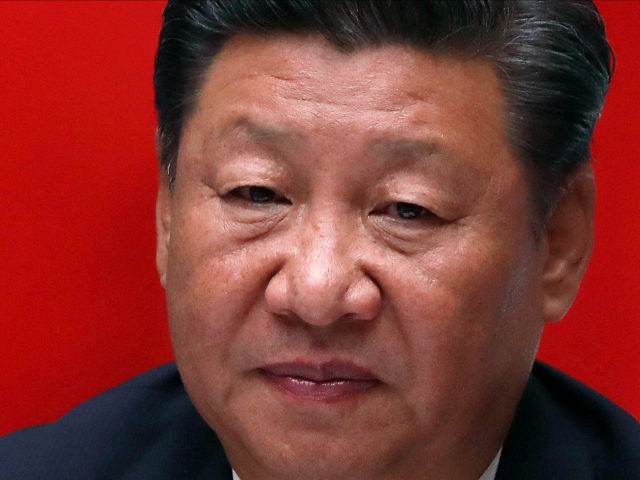The U.S. delegation to the United Nations blocked a resolution China introduced Friday that would have glorified the “win-win” agenda of President Xi Jinping.
Critics saw the resolution as part of China’s alarmingly successful effort to corrupt and destroy the entire human rights system at the United Nations.
Not only would the resolution appear to be dragging the United Nations into China’s corner in its current trade dispute with the United States, it was introduced in the Human Rights Council, so American diplomat Jason Mack argued that China was trying to whitewash its appalling human rights record.
“It is clear that China is attempting through this resolution to weaken the U.N. human rights system and the norms underpinning it,” said Mack. “The ‘feel good’ language about mutually beneficial cooperation is intended to benefit autocratic states at the expense of people whose human rights and fundamental freedoms we are all obligated as states to respect.”
He said the United States would not be part of an effort to subordinate human rights to “other aims such as those related to development or trade.”
“They have been clear about their intent to glorify their head of state by inserting his thoughts into the international human rights lexicon,” Mack said of the Chinese.
“A true example of cooperation in promoting and protecting human rights would be for China to release citizens it has wrongly detained or to protect the right of religious minorities to freely practice their religion,” he suggested.
Activist group Human Rights Watch took the U.S. side of the dispute and criticized countries like Australia, Britain, Japan, and Switzerland for merely abstaining from the vote on the resolution, instead of voting “no” as America did. In the final count, there were 28 votes in favor, 17 abstentions, and only the United States actively voting against the Chinese resolution. Some of the language praising China and quoting from Xi Jinping’s speeches was watered down in the final version, however.
When China first introduced its “Promoting the International Human Rights Cause through Win-Win Cooperation” resolution at the beginning of March, Human Rights Watch (HRW) chided that it was “anything but.”
“Focusing only on intergovernmental dialogue and cooperation, rather than actual human rights violations or accountability for those, is obviously a ‘win’ for China, but it’s not clear who the other winner is,” HRW said, adding:
Certainly not victims of torture, arbitrary detention, and enforced disappearances. Certainly not many communities in the developing countries China claims to speak for – communities that deal with damaging, sometimes deadly, impacts of Chinese political and economic influence over their own governments. And certainly not the UN human rights system, which China has assiduously sought to weaken in recent years.
China’s campaign to weaken the international human rights system is a subject Human Rights Watch has addressed several times during the current U.N. session. HRW recently noted that groups critical of China are having a tough time obtaining United Nations accreditation these days, and the atmosphere for independent civil-society activists groups, especially those dedicated to freedom of the press, is growing chilly.
Ted Piccone of the Brookings Institution told the New York Times on Friday that China is “stepping out of the shadows to use its increasing leverage globally to get what it wants.”
What China wants is to redefine “human rights” as a matter to be debated entirely between state actors, with a minimal role for independent activist groups. China would then be able to use its diplomatic and economic muscle to have the most troubling concerns about its human rights record waved aside.
Authoritarian regimes like China, Russia, and anti-Israel states in the Middle East have already turned the Human Rights Council into a circus. The New York Times captures the scene under the big top on Friday:
Council members have also pointed to the Trump administration’s flirtation with torture and the sometimes racist language used by right-wing political leaders in the West as examples of a double standard. The United States has itself has threatened to pull out of the Human Rights Council over perceived bias against Israel.
A reminder of how harshly China can approach human rights issues came on Friday when five United Nations experts expressed alarm over the deteriorating health of Jiang Tianyong, a prominent lawyer whose defense of other activists earned him a two-year prison sentence in November on incitement charges.
Mr. Jiang was reportedly weak, they said, and suffering severe memory loss, raising fears that he might have been drugged, tortured or ill treated in detention.
“Their interest is to promote their system and their system is not in accordance with universal human rights, so they are using every opportunity to distort human rights to protect their system. That’s the ideological battle we are entering into in a whole new way,” Piccone warned.

COMMENTS
Please let us know if you're having issues with commenting.